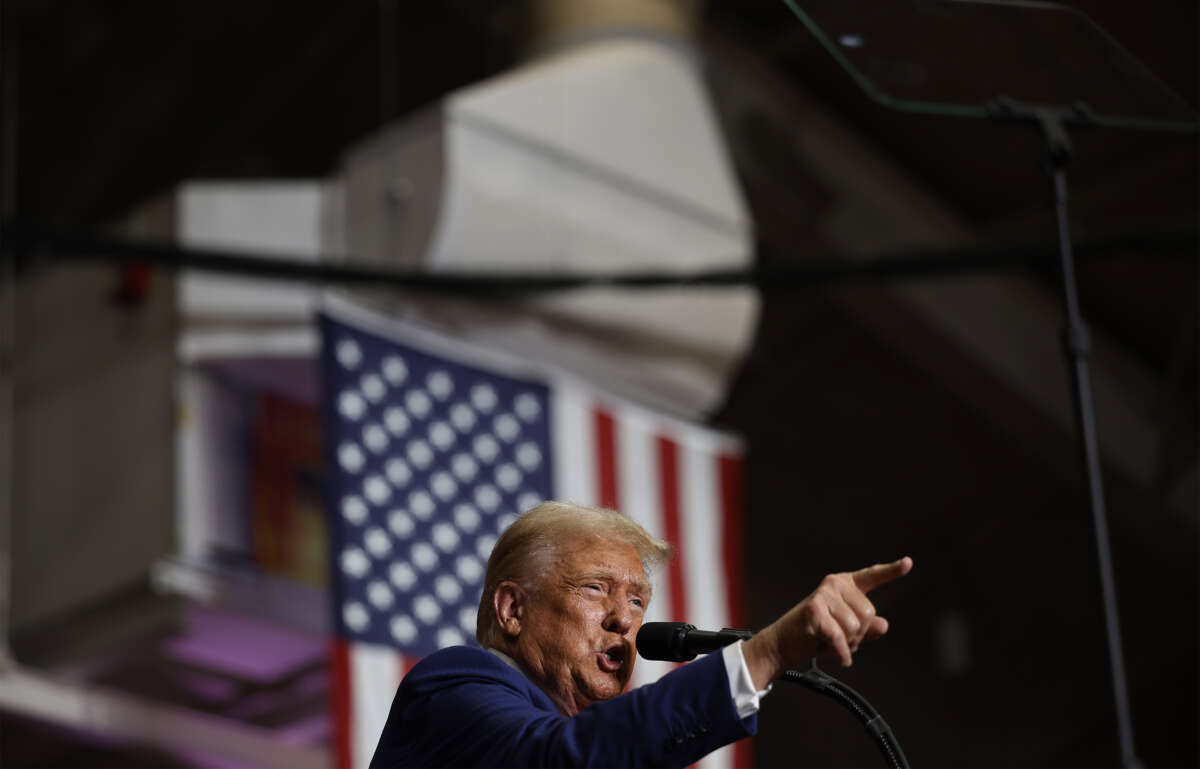During a campaign rally last week for former President Donald Trump in Johnstown, Pennsylvania, Trump praised a man who jumped over the press barricade moments after he had railed against the media in his speech.
The man breached the barricade shortly after Trump referred to the media as the “enemy of the people,” a phrase he has employed for at least half a decade and that critics have noted echoes statements by authoritarians throughout history.
After breaching the barricade, the man, who was later identified as Pittsburgh resident Stephen Weiss, clung to an inner section where media was filming the event. It appeared that he was trying to climb into that area — but before he could, he was tased by police, removed from the arena and arrested.
It was later revealed that Weiss had hopped over the barricade in hopes of unfurling a banner in protest of Trump. However, due to Trump’s comments beforehand, many observers who were present misinterpreted his climbing into the press section as an attempt to attack the media — including, apparently, Trump himself.
During the period of time that it appeared that Weiss was targeting the press, Trump was celebratory, calling it “beautiful” that he had breached the press section.
“That’s alright. That’s OK. No, he’s on our side,” Trump told his audience, who had begun booing Weiss after security had pulled him away from the barricades. “We get a little itchy, don’t we? No, no, he’s on our side.”
“Is there anywhere that’s more fun to be than a Trump rally?” Trump added.
Journalist Matthew Kendrick described Trump’s words as a “disturbing open call to violence.”
Police have charged Weiss with a number of misdemeanors, including disorderly conduct, resisting arrest and disrupting a meeting.
The incident serves as a stark reminder of Trump’s animosity toward the press, observers have commented.
Trump has long issued attacks against the media, peddling unsubstantiated claims to his loyalists that journalists are biased against him and part of a conspiracy to defeat him. Trump began calling the press “enemies” of the people while he was in the White House, and has, at various points, demanded that outlets have their media licenses revoked for not covering his speeches or for publishing unflattering reports on him, wrongly describing such coverage as “election interference.”
While Trump was president, his administration also attempted to deny press credentials for CNN’s Jim Acosta, simply because the journalist had asked Trump a question he disliked during a press conference at the White House in November 2018. In defending the move, the Trump administration claimed that “No journalist has a First Amendment right to enter the White House,” a statement that the ACLU said flew in the face of precedent, as the White House is considered government property, and therefore “belongs to the people, not the president.”
Trump’s brazen attacks on the press have incited violence by some of his followers. In 2018, for example, a Trump loyalist named Cesar Sayoc sent pipe bombs to prominent critics of Trump, including members of the media who Trump had vehemently criticized.
While Trump maintains that he is not responsible for the actions of his followers, an ABC News analysis from 2020 found dozens of instances in which his followers carried out violence in his name because they believed Trump wanted them to do so.
Our most important fundraising appeal of the year
December is the most critical time of year for Truthout, because our nonprofit news is funded almost entirely by individual donations from readers like you. So before you navigate away, we ask that you take just a second to support Truthout with a tax-deductible donation.
This year is a little different. We are up against a far-reaching, wide-scale attack on press freedom coming from the Trump administration. 2025 was a year of frightening censorship, news industry corporate consolidation, and worsening financial conditions for progressive nonprofits across the board.
We can only resist Trump’s agenda by cultivating a strong base of support. The right-wing mediasphere is funded comfortably by billionaire owners and venture capitalist philanthropists. At Truthout, we have you.
We’ve set an ambitious target for our year-end campaign — a goal of $250,000 to keep up our fight against authoritarianism in 2026. Please take a meaningful action in this fight: make a one-time or monthly donation to Truthout before December 31. If you have the means, please dig deep.
